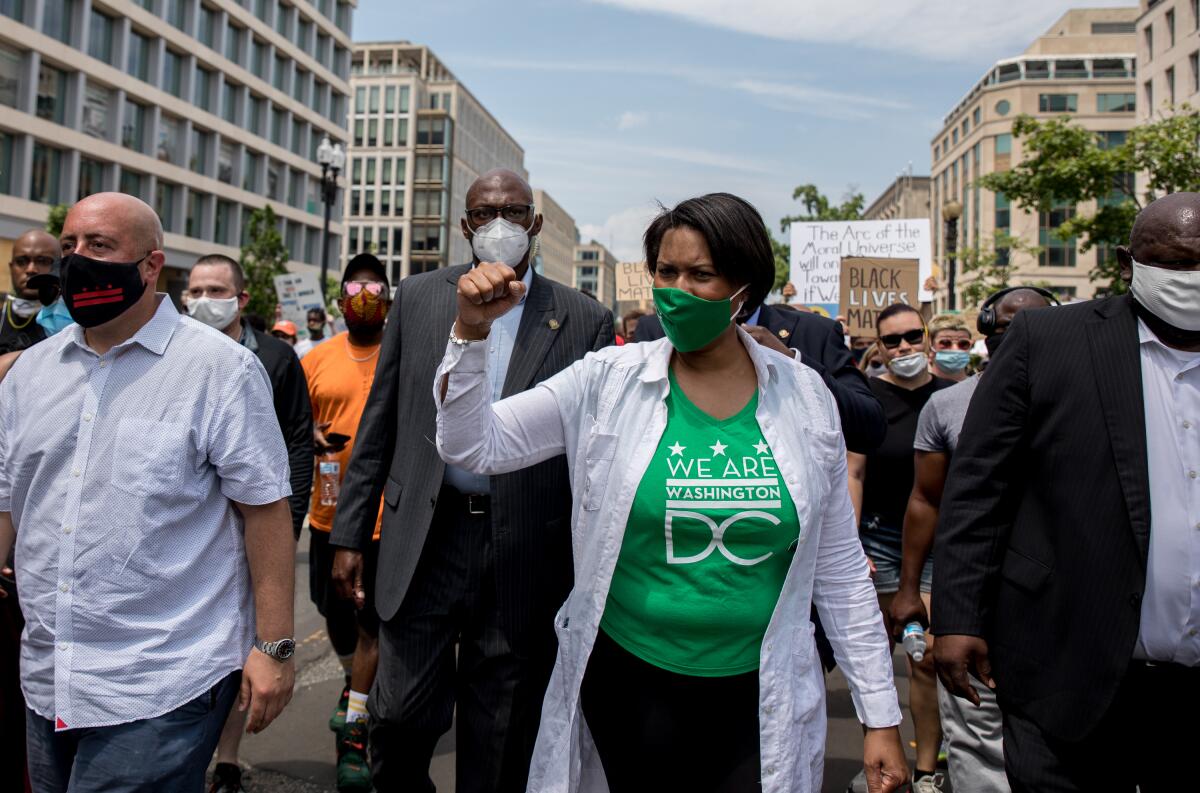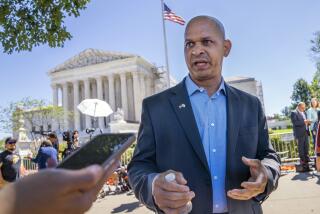D.C. Mayor Muriel Bowser finds herself in the national spotlight as Trump’s latest foil

WASHINGTON — When President Trump on Saturday used his first political rally in months to attack Washington, D.C., Mayor Muriel Bowser as an incompetent radical, she was ready to slap back.
Bowser quipped that it seemed she was Trump’s new obsession — “living in his head, and apparently there’s a lot of empty room in there ... just like tonight’s half-empty Tulsa arena.”
The mayor’s reference to the underwhelming turnout at Trump’s Oklahoma rally was the latest acrimonious exchange with the president. Until recently a successful but unspectacular mayor who was little-known outside the Beltway, Bowser has soared to national attention with a new activism and willingness to challenge Trump amid the global outrage over the police killing of George Floyd a month ago in Minneapolis.
Trump may be the world champion of insult-hurling, but for Bowser, this is new territory. Her ongoing fight with the president has made her a hot commodity on television news, late-night comedy and a CNN town hall.
In an interview, Bowser insisted she was simply doing what she always had: fighting for her city.
“It’s always the right moment to stand up,” she said.
She acknowledged, however, that the stakes of the struggle grew higher amid the COVID-19 pandemic and Trump’s unprecedented crackdown on peaceful protesters in Lafayette Square, including the use of chemical agents, helicopters and mounted police.
Bowser won widespread acclaim when she challenged Trump’s attempts to use active-duty military troops against American demonstrators on the streets of the nation’s capital.
Days after the June 1 confrontation, Bowser defiantly renamed as “Black Lives Matter Plaza” the two blocks of 16th Street that end at Lafayette Square and the front door of the White House. She even had city workers paint giant neon-yellow letters along the street that spell out “Black Lives Matter.”
“We have to speak up loudly for more justice and more peace!” she declared in an appearance at a massive demonstration on June 6 near the White House. “I’ve been shocked about how the federal government behaved against American citizens.”
As a foil for Trump, Bowser, 47, checks all the boxes. Black. Female. Leader of a city that has a history of mismanagement, poverty and civil rights struggles. She’s also the single mother of an adopted 2-year-old daughter.
She may not see herself in a new light, but colleagues do. They say her metamorphosis from mild-mannered technocrat to something of an action hero is quite the departure for Bowser and her otherwise carefully planned political trajectory.
“This was a sea change for her,” said Elissa Silverman, a member of the district’s governing council and frequent critic of Bowser over taxes, spending and even police reform. On this issue, however, “I was right behind her.”
Bowser by all accounts has been a cautious, middle-of-the-road politician. She started as a D.C. council member for eight years from Ward 4, the heart of Washington’s Black elite political establishment. Since being elected mayor in 2015, Bowser has acted deliberately, earning credit for improving schools and forging a reputation as friendly to business and developers.
Most controversially, Bowser earlier this year endorsed former New York Mayor Mike Bloomberg in his short, ill-fated campaign for the Democratic presidential nomination. She called him a “problem-solver with a proven track record of getting things done.”
It was a critical endorsement for Bloomberg, whose “stop and frisk” policy as mayor left much of the Black community distrustful of the billionaire.
Balancing her political instincts as a pragmatist with the progressive tide sweeping her city will prove difficult. Even as her national profile grows, some in the Black Lives Matter movement back home remain skeptical, calling the painting of their logo on 16th Street an empty gesture.
“We will not be hushed into falling for these performative actions,” the group said in a statement.
At an unusually contentious City Council meeting last week, which drew hundreds of people rather than the usual handful, residents demanded more forceful action to reform the police, including defunding the agency. More than 16,000 citizens’ statements were submitted to the council.
Instead, Bowser is proposing at a $20-million increase for police, about 3%.
“I’m tired of coming up here and testifying to y’all,” resident Jessica Shotwell testified. “We don’t want any more cops, and they don’t need more money.”
Wes Gobar, a community organizer, testified: “You paint ‘Black Lives Matter,’ but your budget shows us Black lives don’t matter.”
Earlier this month, several hundred people protested outside Bowser’s home, venting their frustration with what they said was inaction and neglect by the mayor. About a dozen police formed a line in front of the house. The demonstration remained peaceful.
A new report by the American Civil Liberties Union found severe racial disparities in D.C. policing, where the percentage of Black men stopped by police was nearly twice the percentage of the city’s Black population. Bowser only made the data available after Black Lives Matter sued her.
Bowser argues that, since a Department of Justice decree 18 years ago, the city’s Police Department has made important reforms, such as the use of body cameras and training that includes deescalation techniques and education in the history of racial discrimination.
Pressed repeatedly at a news conference last week, Bowser launched into a discussion of budgeting and administrative process that left few critics satisfied.
“I submit a budget. The council can change it,” she said. “I’m not doing a do-over of our budget. That’s not how it works. ... We have submitted a budget we need for public safety in the district. Part of that is policing.”
In the interview with the Los Angeles Times on Friday, Bowser stood her ground.
“We are constantly focused on making sure that we are reforming our Police Department to be fair and just and to hold officers accountable,” Bowser said. “We take it very seriously every year in how we invest in police and community relations.”
On 16th Street, some critics have used pastel chalk to deliver a counter-message: “Mayor Bowser endorsed Mike ‘Stop-N-Frisk’ Bloomberg and DC cops still Stop-N-Frisk.” Others painted “DEFUND THE POLICE.”
“She says, ‘I’m here for you,’ and then she supports bills that support the police,” said Tiffany Schatz, a 27-year-old emergency medic, as she joined the demonstrations June 13. “Do you really have our back? Do you really care? You can’t straddle the fence anymore.”
Protester Sarah Pillar, 21 and a student, said she feared Bowser was too beholden to developers and the business community. “Renaming the plaza is great, but it has to be followed up with policy.”
Bowser’s moderate, pro-business approach reflects a dramatic change in the city she represents. Once so badly managed that federal authorities took over in 1995, the nation’s capital today is relatively prosperous. Investment is thriving, and real estate prices have exploded. At the same time, there has been a seismic demographic shift and gentrification, reducing the Black population from around three-quarters in the 1980s to 46% today.
The history explains Bowser’s caution. The last thing she and other D.C. officials want is cause for the feds to take over the city again. She was careful to avoid most antagonistic confrontations with Trump during his first three years in power.
After she told Trump that he must remove security forces from Washington streets, he tweeted that Bowser was “incompetent” and “always looking for a handout.” In fact, the district has ample reserve funds that only now it is dipping into to get through the economic crisis generated by the coronavirus outbreak.
Bowser’s newfound fame may prove particularly helpful for one of D.C.’s biggest priorities: the decades-old quest for statehood. This is a town where license plates complain: taxation without representation. Somewhere between a city and a state, the nation’s capital, home to 700,000 people, has a special status, with considerable control still in the hands of Congress and only a nonvoting representative in the House.
This week, the House is expected, for the first time, to vote in favor of granting D.C. statehood.
“It’s huge, a huge thing,” Bowser said, though she acknowledged that the measure would die if it came up for a vote in the Republican-controlled Senate. Trump and others have said they oppose D.C. statehood precisely because it will add more Democrats to Congress.
“Is that fair?” she said. Washington “is the only capital in the world that pays taxes and has no representation” in the legislative body. “It has to change.”
Bowser is clear-eyed about the challenge, convinced that the recent turmoil in her city will inform Americans about its needs.
“We have seen how important statehood is, and now the entire country has seen it,” she said. “We have incredible momentum. I’m feeling very energized.”
More to Read
Get the L.A. Times Politics newsletter
Deeply reported insights into legislation, politics and policy from Sacramento, Washington and beyond. In your inbox three times per week.
You may occasionally receive promotional content from the Los Angeles Times.











